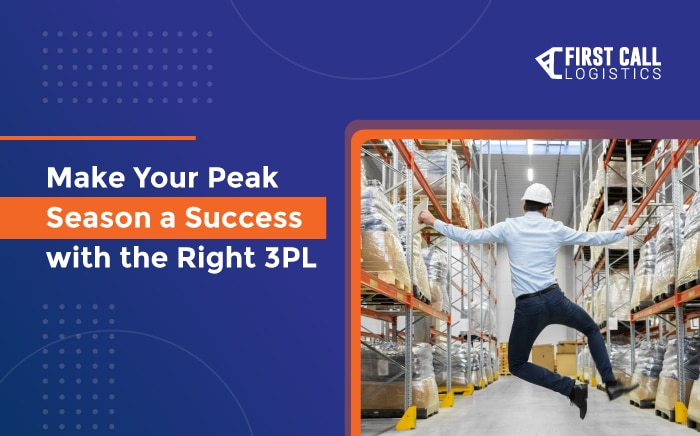Make Your Peak Season a Success with the Right 3PL

Retail’s peak season, spanning early October’s fall sales events to December’s gift-giving free-for-all, contains 90% of the calendar year’s best-selling days in Ecommerce. This essential period for online retailers doubles as an annual test of supply chain resiliency for brands navigating strained capacity, harsh winter weather, inventory management struggles and tricky demand forecasting — all challenges a strong 3PL partner comes readily equipped to handle.
Read on for some of this year’s most important peak season trends — and how 3PLs can benefit partners during this crucial period.
Understanding Peak Season
Every industry has its own busy season timetable. For online retailers, peak season preparations often begin as early as July. That doesn’t necessarily mean brands are unveiling their holiday-themed displays and promotions before Labor Day, but taking stock of current inventory and looking ahead to potential year-end trends well in advance sets the table for a successful Q4 sales push.
For example, this year’s consumer attitudes toward holiday shopping are all but guaranteed to be affected by high inflation. Despite most retailers expecting growth in overall holiday sales compared to 2023, stingier buying habits drive conversion rates down — and encourage more “comparison shopping” as customers hope to find a better deal among competitors.
Changes to customer buying habits naturally impact a company’s sales outlook, which tends to ripple through the rest of the supply chain (sometimes to some extreme consequences). Thus, it takes a considerable amount of care to ensure inventory is in order before the holiday season hits its stride. The lead-up to an Ecommerce brand’s peak season usually goes something like this:
- Holiday Preparations. Q4 demand forecasts direct manufacturing and inventory needs. Products and materials from overseas are ordered well in advance (note this year’s port/ocean freight environment has retailers on an especially cautious timeline).
- Peak Season Kick-Off. The first signs of year-end deals and events take flight in early October, activating the seasonal spending extravaganza. In fact, while holiday sales naturally peak in late November-December, nearly a third of this year’s holiday shoppers plan to start in October (or sooner).
- Thanksgiving Week (and Beyond). The days immediately following Thanksgiving are some of the year’s busiest shopping days. Black Friday accounted for $9.8 billion in sales last year; Cyber Monday topped that with a whopping $12.4 billion.
This Year’s Peak Season Trends
Accounting for every variable which might impact demand, inventory or available carrier capacity is a tall order, but keeping the year’s broader trends in mind is a good start toward an accurate demand forecast. For peak season 2024, retailers will likely need to factor in the following:
- A Rise in Return Fraud. Ecommerce losses to fraudulent returns (fake shipping labels, counterfeit items, empty boxes and so on) reportedly leapt from $41 billion to $48 billion between 2022-2023.
- Customer Interest in Sustainability. Not every industry will be thrilled to hear it, but the consumer-driven call for more sustainable business practices is only growing louder as eco-conscious consumers continue to prove the value of transparent, sustainable business practices.
- Ongoing Geopolitical Disruptions. Climate change, U.S.-China tensions, the Red Sea conflict, Russia’s war on Ukraine and about a dozen other factors continue to play a major role in the global supply chain’s functionality — and the speed at which certain goods can traverse great distances.
Simplifying Peak Season with a 3PL
Peak season brings its share of burdens to parties across the supply chain, but you don’t need to navigate them alone. The right third-party logistics (3PL) company can take the weight off your shoulders. Here are just a few of the ways a 3PL can help you make your next peak season a success:
- Improve shipment visibility. A good 3PL provides visibility at every level of the supply chain. The ability to track carrier movements and alert customers to potential shipping delays and act quickly to mitigate delays can make or break the customer experience.
- Refine your warehousing strategy. The right 3PL can help you implement a diversified warehouse strategy across multiple distribution centers. When applied correctly, a decentralized inventory strategy shortens shipping times and provides customers with additional pickup locations where available. A 3PL may also offer additional warehousing services, including in-house storage facilities, cross-docking, pallet restacking and other convenient quality-of-life upgrades.
- Provide cost savings and added services. Businesses looking to move goods efficiently while maintaining supply chain flexibility can benefit from a 3PL’s comprehensive approach to shipping. Flexible shipping and storage via 3PL partner allows brands to quickly adjust their warehousing and carrier services as needed without paying for any excess resources. Comprehensive shipping services grant access to multiple modes and methods of cargo transport (including LTL, expedite and rescue freight options) to ensure essential cargo reaches its destination on time.
3PLs are designed to boost your business’ existing supply chain with nationwide carrier networks, in-house facilities and experience catering services to each partner’s unique circumstances. Ready to learn more about how First Call can support your business this peak season? Contact us today!
Simplify your Next Shipment with First Call Logistics
Building and managing cost-efficient supply chains is a full-time job. First Call’s rare combination of in-house assets, expert problem-solving and track record of stellar customer service makes us the 3PL of choice for business partners with a wide range of shipping needs.
More Resources for FCL Shippers:
Get the latest supply chain news and updates directly to your inbox.